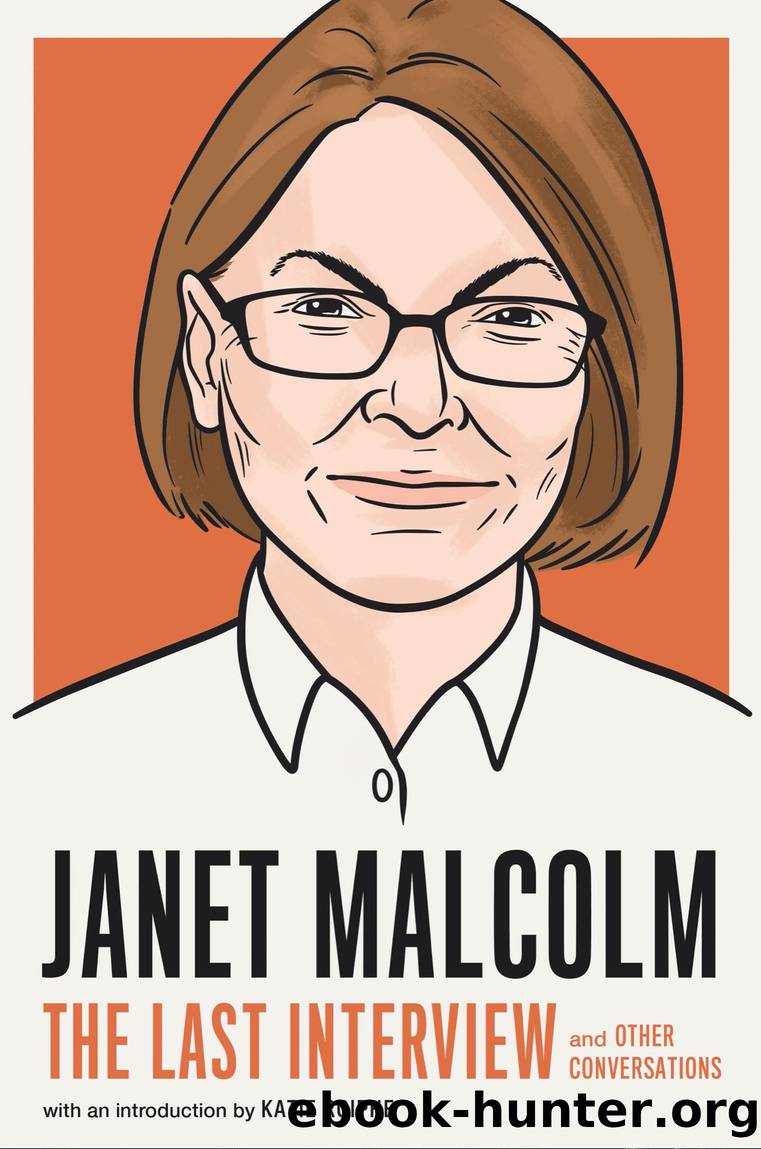Janet Malcolm: the Last Interview by Unknown

Author:Unknown
Language: eng
Format: epub
Publisher: Melville House
Published: 2022-06-07T00:00:00+00:00
WACHTEL: Janet Malcolm, reading from the opening of The Journalist and the Murderer. What makes people want to talk and reveal themselves to the journalist or the biographer?
MALCOLM: Not everybody has this desire, but the people who do feel they have a story to tell. They want to get that story told, and theyâre not writers themselves. So the writer becomes an instrument or vehicle for getting this story told. I think thatâs the impulse.
WACHTEL: The idea of betrayal comes up frequently in your work. Thereâs an instance of a Gertrude Stein biographer, Leon Katz, whoâs fearful of being betrayed, or the other biographers who feel betrayed because he wonât share his material. The feeling of betrayal to the biographers of Sylvia Plath. Youâve even suggested that an autobiographer can set himself up for a betrayal no less profound than the subject of anotherâs writing. Why do you think the subject of betrayal is something thatâs your subject?
MALCOLM: [laughs] Thatâs very interesting. Youâre kind of putting me on the spot.
WACHTEL: Itâs an intriguing subject because it involves conflict, which is inherently dramatic, and seduction and betrayal, as the old cliche goes, and expectation, or hope, and loss. I can see its attraction for a writer.
MALCOLM: As we speak, Iâm now thinking about people who come to me. It doesnât all come from me and my interests. Thereâs so much of this feeling out there, especially among the people who want to talk to journalists. In In the Freud Archives, Jeffrey Masson wanted to talk about how heâd been betrayed by the psychoanalytic establishment.
WACHTEL: Because he was initially hired to be the head of the archives, and then when he wanted to write his own view of Freudâsâ¦Maybe you could explain it.
MALCOLM: He had views that were not the views that the psychoanalytic establishment had. They kicked him out of his job and he wanted to tell me the story of his betrayal. And some of the other characters in that book, a man named Peter Swayle, also felt betrayed in some other respect. Itâs probably some kind of dovetailing of subject and interviewer that creates this pattern of my writing about betrayal.
WACHTEL: Then in the end, Jeffrey Masson felt betrayed by you, he ended up suing you for libel and defamation, though ultimately you won. Clearly he felt betrayed. Did you feel betrayed by his coming after you?
MALCOLM: No, I felt a little sheepish. I hadnât seen it coming, because thatâs very characteristic behavior. When he felt betrayed by his patron at the Freud archives, Kurt Eissler, he sued him, so this should not have been a piece of surprising behavior on his part. Usually when subjects feel betrayed, as Jeffrey Masson did, they find something else. Jeffrey Masson sued me not for betrayal but because he said I had misquoted him. And then I had to do a lot of work to show that I had not, and in that case had a little novelistic drama which hinged on some notes I had lost.
Download
This site does not store any files on its server. We only index and link to content provided by other sites. Please contact the content providers to delete copyright contents if any and email us, we'll remove relevant links or contents immediately.
| Actors & Entertainers | Artists, Architects & Photographers |
| Authors | Composers & Musicians |
| Dancers | Movie Directors |
| Television Performers | Theatre |
Cecilia; Or, Memoirs of an Heiress — Volume 3 by Fanny Burney(31033)
Cecilia; Or, Memoirs of an Heiress — Volume 2 by Fanny Burney(30980)
Fanny Burney by Claire Harman(25819)
We're Going to Need More Wine by Gabrielle Union(18121)
Plagued by Fire by Paul Hendrickson(16664)
Cat's cradle by Kurt Vonnegut(13951)
Bombshells: Glamour Girls of a Lifetime by Sullivan Steve(13156)
All the Missing Girls by Megan Miranda(12831)
Leonardo da Vinci by Walter Isaacson(11965)
4 3 2 1: A Novel by Paul Auster(11113)
Adultolescence by Gabbie Hanna(8173)
The remains of the day by Kazuo Ishiguro(7621)
Note to Self by Connor Franta(7050)
Diary of a Player by Brad Paisley(6887)
Giovanni's Room by James Baldwin(5959)
What Does This Button Do? by Bruce Dickinson(5564)
Recovery by Russell Brand(4596)
Born a Crime by Trevor Noah(4557)
The Kite Runner by Khaled Hosseini(4524)
